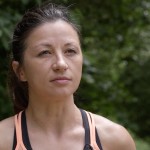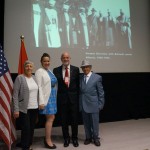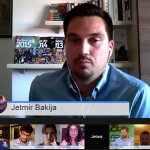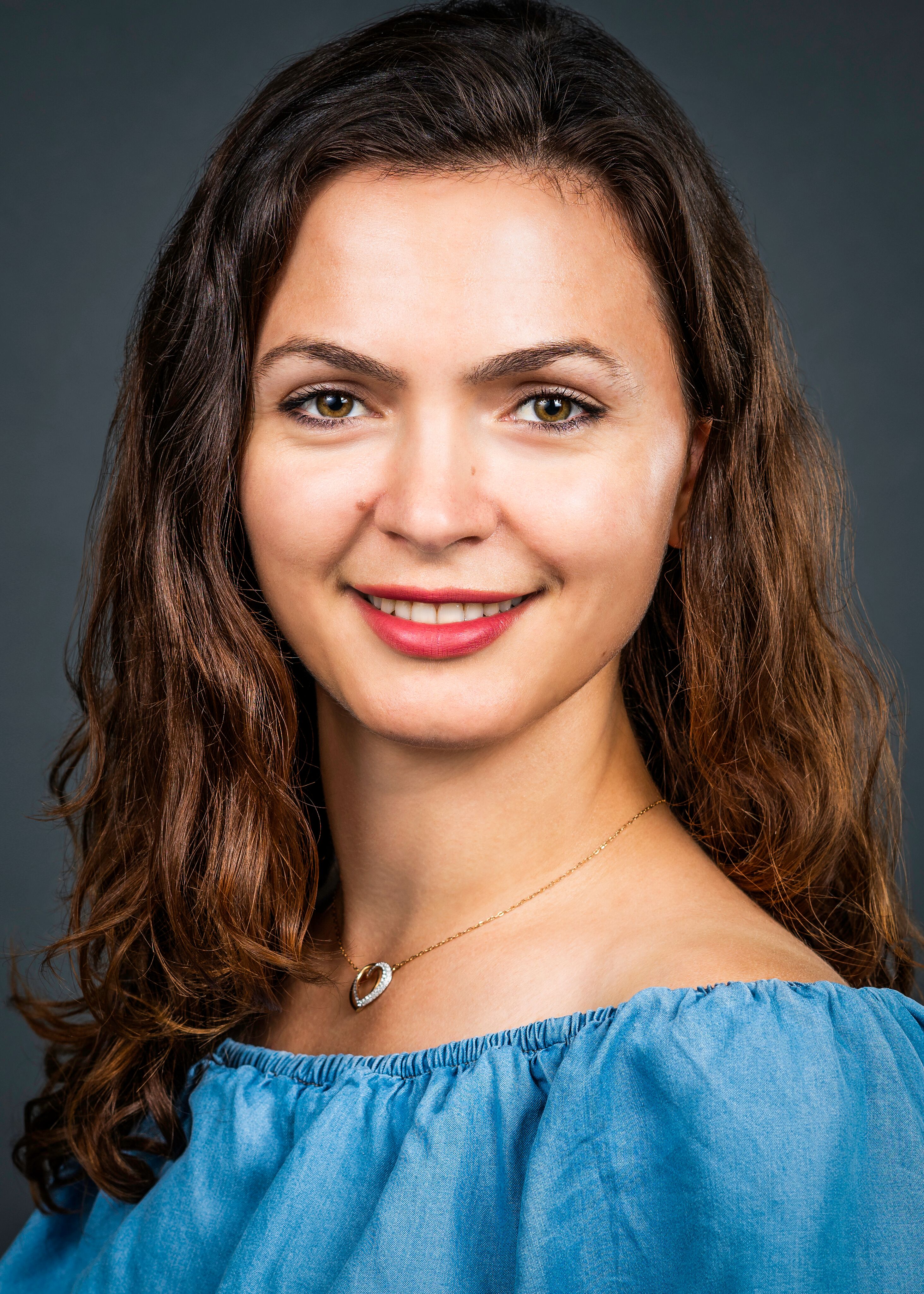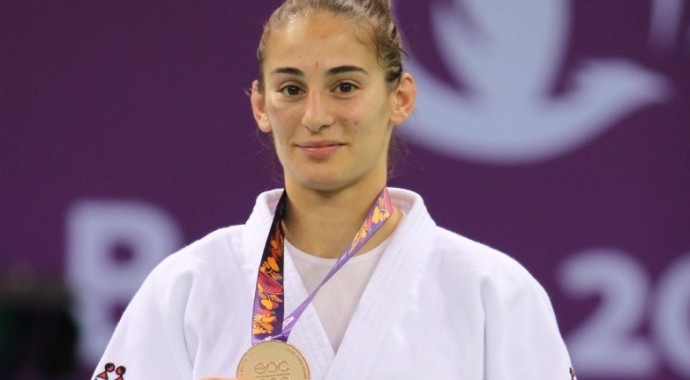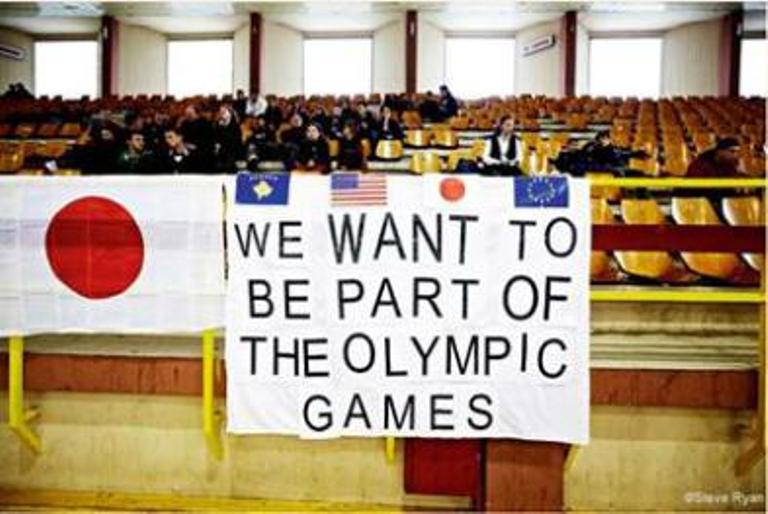
Financial Times Article: “One of the worlds’ top judo stars fights to represent Kosovo in Olympics”
By: Kosovo Diaspora July 26, 2012
By Luke Browne, freelance writer
It’s a weary Sunday afternoon in Peja, a town tucked into the entrance of the Rugova canyon, near Kosovo’s stunning western frontier. Raindrops tap on the roof of the creaking sports hall as Majlinda Kelmendi, world judo star, national hero and local girl, tries desperately to evade the press pack within. Kosovar journalists are hungry for an interview with the 21-year-old, who has just seen off challengers from Bosnia-Herzegovina and Montenegro at a spring meet for Balkan judoka.
“I can hold on for a few more days,” she says. “Next week I’m going to Slovenia, and I have to stay focused on my training. I’m so happy I won’t have journalists asking me questions. If I have press and cameras every day … it gets confusing.”
Kelmendi will have to get used to the attention. Last October, she bagged gold medals at World Cups in Italy and Belarus, and at the Abu Dhabi Grand Prix. She is currently ranked sixth in the world in the under-52kg division by the International Judo Federation (IJF), which means she is guaranteed a place at the London 2012 Olympics. But that’s not why journalists are clamouring to meet her. Athletes from Kosovo cannot represent their country at the Olympic Games, and next week, the International Olympic Committee (IOC) will decide which flag Kelmendi will be competing under this summer.
“I’ve worked so hard for this, I’ve dreamed of representing my country at the Olympics, and I really don’t want someone to tell me it’s not possible to fight for Kosovo in London,” she says. “I don’t understand why everything has to be about politics.”
Since declaring independence from Serbia in February 2008, Kosovo has busied itself with state-building at home and gaining acceptance abroad. It has its own government, police force and central bank, and its two million citizens can carry a Kosovar passport, hum along to the lyric-less national anthem, “Europe”, and salute a star-speckled, blue and yellow national flag. Kosovo is recognised by 90 countries, and is a member of the International Monetary Fund and the World Bank. But Serbian lobbying has kept Kosovo locked out of the IOC and most international sports federations, according to sports minister Memli Krasniqi, preventing the tiny Balkan nation’s best athletes from competing outside the country unless they represent another state.
Kelmendi’s second – Albanian – passport enabled her to compete in Italy and Belarus last autumn, and it was the Albanian anthem that played when she became European Junior Champion in 2009 and 2010. The IJF’s sympathetic president, Marius Vizer, has also permitted her to represent the federation as an independent athlete, including at the 2009 World Junior Championships in Paris, where she took gold. With Serbia determined to stymie its former southern province’s aspirations for nationhood (and countries such as Russia, China and Spain keen to restrict Kosovo, due to their own bubbling secessionist movements at home), the IOC is unlikely to allow Kelmendi to represent Kosovo in London. A compromise, enabling her to compete independently under the Olympic flag – as athletes from the former Yugoslavia did in Barcelona in 1992 – is being mooted.
Kelmendi says that twice-daily three-hour training sessions in the mountains help keep her focused on the competition itself, and less on the unique pressure she is under. Her coach, Driton Kuka, is “putting her in quarantine” and banning all press from mid-May onwards. But as the only athlete travelling from Kosovo to the Olympics (with all-too-rare government sponsorship, after Azerbaijan tried to poach her) she’s worried that her compatriots have lost sight of the challenges awaiting her at the games.
“I’m happy and scared at the same time,” she says. “It’s a historic moment for us, and I’m not afraid of the opponents, but I’m the only athlete from Kosovo going to London, and people here look at me like I’m a hero. They want success from me, and I don’t want to disappoint them, but it’s the Olympics – anything can happen.”
Kelmendi started practising judo at Peja’s Ippon Judo Club in 1999, when she was eight, a few months after most of her home town was burned out during the war with Serbia. Kuka, whose own career was cut short at 19 by the Yugoslav wars, built the club on his own land, and after a handful of training sessions dispatched Kelmendi to a competition in Sarajevo, where she came third by default after only two other fighters showed up. A silver medal at the European Children’s Championship in Turkey two years later sealed the matter.
“I started to really like judo because I made new friends, I saw new cities, and I realised that this was a way for me to really be somebody,” Kelmendi explains. “At the beginning, my parents didn’t believe that I could do this through sport, but when they saw that I was working hard, and that I was good at judo, they were very happy, and very proud.”
Her family home is a stone’s throw from Kuka’s dojo; college studies in banking and finance have effectively been jettisoned until after the Olympics; and while her face stares down at traffic from a billboard in Kosovo’s capital, Pristina, she stays in most evenings.
“I’m not the kind of girl who likes parties, I only have three or four friends, and I don’t even have time for them right now. Training takes up a lot of my day, it’s tiring, and afterwards I need to be at home with my family to rest,” she says, evincing little or no regret. Perhaps that’s because she’s had a taste of what it might be like to win gold for Kosovo at an international competition, with the world watching. Immediately after her semi-final win as an IJF athlete at the World Junior Championships in 2009, the federation’s president took Kelmendi aside and promised her that if she became world champion, Kosovo’s national anthem would be played. When she mounted the podium to receive her gold medal, the opening bars of “Europe” rang out for the first time at an international sports event.
“It was a really special moment, not just for me, but for all people in Kosovo,” Kelmendi says. “And whatever happens [at the IOC meeting next week], I’m so, so proud that I’m going to be fighting for my people at the Olympics.”
***
Source: Luke Browne. “The Olympics Interview: Majlinda Kelmendi.” Financial Times. May 19, 2012. http://www.ft.com/cms/s/2/85998206-9ef4-11e1-a767-00144feabdc0.html#axzz21lEUySAi

